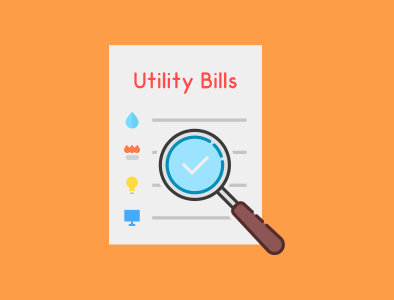What is a Utility Bill?
A utility bill is an invoice that a utility company issues for the use of their services. These services are essential for daily living and include electricity, gas, water, sewage, and sometimes waste collection. Utility bills provide a detailed account of the charges incurred over a billing period, often monthly or quarterly, and you must pay them by the due date to avoid service interruptions.
Types of Utility Bills
Electricity Bill: This bill covers the cost of electrical power used in your home. It includes a fixed supply charge and a variable charge based on kilowatt-hour (kWh) usage. Additional charges for green energy initiatives or network costs might also be included. A meter, which can be either analog or digital (smart meter), tracks your usage.
Gas Bill: The gas bill charges for natural gas used for heating, cooking, and hot water. It consists of a supply charge and a usage charge measured in megajoules (MJ) or cubic meters (m³). Like electricity, a meter monitors your gas usage.
Water Bill: This bill includes charges for water consumption and wastewater services. It has a fixed service charge and a variable usage charge based on kilolitres (kL) of water used. Usually located outside the home, a meter records your water usage.
Sewage Bill: Often combined with the water bill, this covers the treatment and disposal of wastewater. It typically includes a fixed charge for service provision.
Council Rates: These are local government charges that cover various community services, including waste collection, road maintenance, and public facilities. Council rates are typically billed annually or semi-annually and are calculated based on the value of your property.
Understanding Your Utility Bill
A typical utility bill will include the following sections:
- Account Information: Your account number, billing period, and due date.
- Service Details: Breakdown of charges for each service provided.
- Usage Summary: Detailed usage information, often presented in graphs or tables.
- Payment Information: Total amount due and payment options (e.g., direct debit, credit card, BPAY).
- Contact Information: Utility company’s customer service contact details.
Tips for Managing Utility Bills
- Monitor Usage: Regularly check your meters and compare usage to previous periods.
- Energy Efficiency: Implement energy-saving measures such as using LED bulbs, efficient appliances, and reducing water wastage.
- Payment Plans: Many utility companies offer payment plans or hardship programs if you have difficulty paying your bills.
- Bill Smoothing: Some companies provide bill smoothing options, spreading costs evenly over the year to avoid large seasonal bills.
- Compare Providers: Periodically compare utility providers to ensure you are getting the best rates and services.
Common Questions About Utility Bills
- High utility bills can result from increased usage, rate hikes, leaks, or inefficient appliances. Reviewing your usage and contacting your provider can help identify the cause.
Many providers offer discounts for on-time payments, direct debit, or digital billing. Check with your provider for available discounts.
Late payments can result in penalties, interest charges, and potential service disconnection. It’s essential to contact your provider if you anticipate payment difficulties.
There are several ways to reduce utility bills:
- Monitor and reduce your energy and water usage.
- Invest in energy-efficient appliances and lighting.
- Insulate your home to reduce heating and cooling costs.
- Regularly maintain appliances and check for leaks.
- Take advantage of any rebates or incentives for energy-efficient upgrades.
If you believe your utility bill is incorrect, contact your utility provider immediately. They can review the bill and your usage data. Possible errors could stem from incorrect meter readings, faulty meters, or clerical mistakes. If necessary, you can request a meter test or have a technician inspect for issues.



